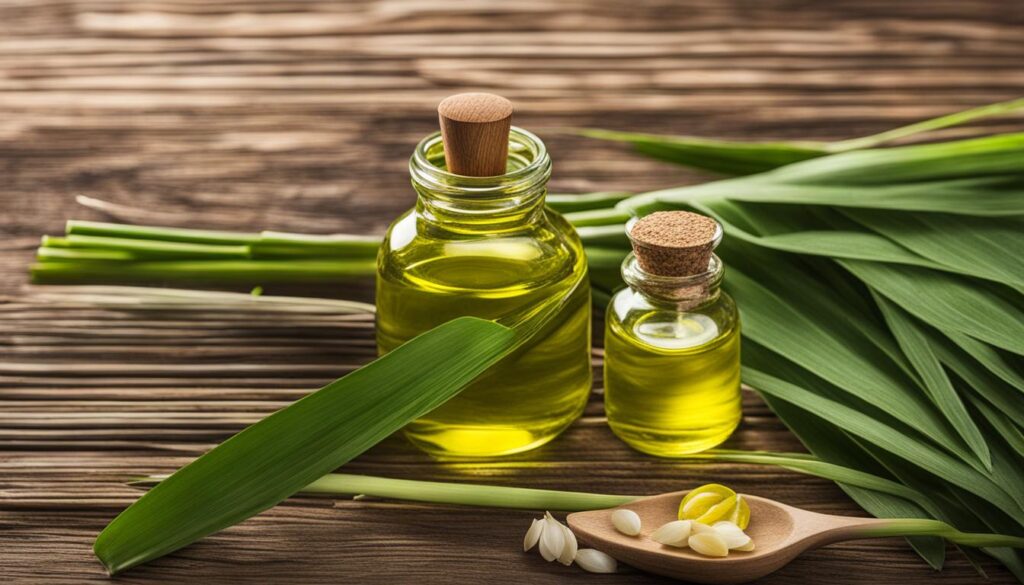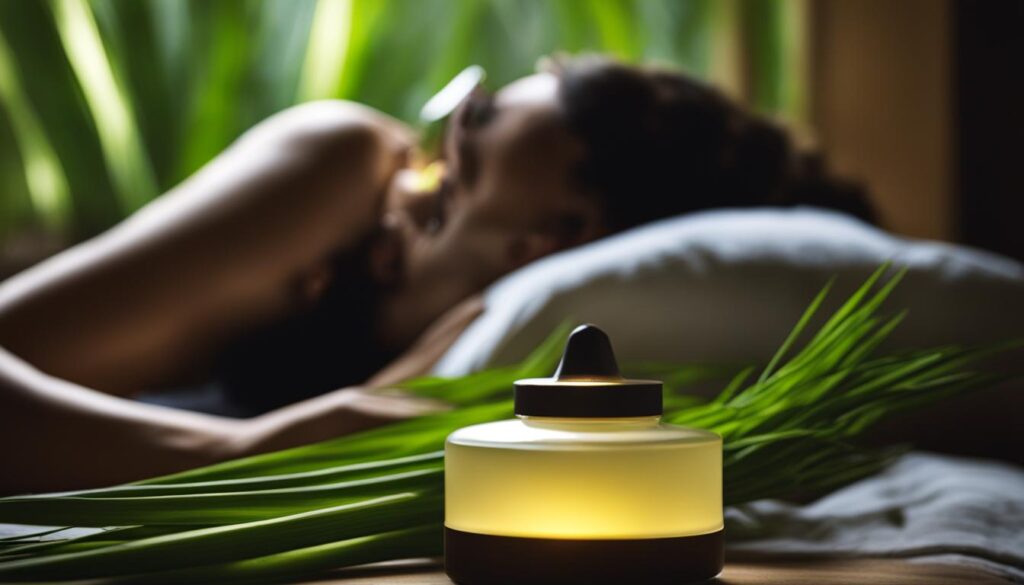Lemongrass oil is a versatile and potent natural remedy that offers numerous health benefits. From its anti-inflammatory and antimicrobial properties to its ability to relieve stress and enhance digestion, lemongrass oil is a must-have for anyone seeking a holistic approach to wellness. In this article, I will guide you on how to use lemongrass oil for various purposes, including skincare, relaxation, and more.
Key Takeaways:
- Lemongrass oil is a versatile and potent natural remedy.
- It has anti-inflammatory and antimicrobial properties.
- Lemongrass oil can be used for skincare, relaxation, and insect repellent.
- Always dilute lemongrass oil before topical use and perform a patch test to check for any skin sensitivities.
- Consult with a healthcare professional before using lemongrass oil if you are pregnant or breastfeeding, a child, or have certain medical conditions.
The Health Benefits of Lemongrass Oil
Lemongrass oil is a natural remedy that offers a wide range of health benefits. Its rich antioxidant content, including phenolic acids, tannins, and flavonoids, gives it powerful anti-inflammatory properties. By reducing inflammation, lemongrass oil can be beneficial for conditions such as heart disease, cancer, and arthritis.
But the benefits don’t stop there. Lemongrass oil also possesses antimicrobial properties, making it effective against harmful bacteria, fungi, and viruses. This makes it a versatile oil for improving overall health and boosting the immune system.
In addition to its anti-inflammatory and antimicrobial properties, lemongrass oil is also known for its positive effects on digestion. It stimulates the production of digestive juices and enzymes, aiding in the digestion process. It can provide relief from digestive issues such as an upset stomach and even help with conditions like gastric ulcers.
Moreover, lemongrass oil has a calming effect on both the mind and body, making it an excellent natural remedy for stress relief and relaxation. Its soothing aroma helps reduce anxiety and promotes a sense of well-being. Whether used in a diffuser or applied topically, lemongrass oil can help create a peaceful and tranquil environment.

The Benefits of Lemongrass Oil at a Glance:
- Powerful anti-inflammatory properties
- Effective in fighting off harmful bacteria, fungi, and viruses
- Improves digestion by stimulating the production of digestive juices and enzymes
- Relieves stress and promotes relaxation
“Lemongrass oil has become a staple in my daily wellness routine. I love how it not only improves my digestion but also helps me unwind after a long day.” – Emily, Lemongrass Oil Enthusiast
Incorporating Lemongrass Oil into Your Skincare Routine
Lemongrass oil is a popular ingredient in many skincare products due to its antimicrobial and astringent properties. It is known for its ability to fight acne, reduce inflammation, and rejuvenate the skin. By incorporating lemongrass oil into your skincare routine, you can experience its numerous benefits for healthier, clearer skin.
Benefits of Lemongrass Oil for Skincare
Lemongrass oil offers several benefits for skincare:
- Reduces inflammation and prevents breakouts
- Soothes and rejuvenates the skin
- Promotes healthy hair and nails
When applied topically, lemongrass oil can help fight acne by reducing inflammation and preventing breakouts. Its antimicrobial properties can also help keep your skin clean and clear. Additionally, lemongrass oil can soothe and rejuvenate the skin, leaving it looking refreshed and revitalized.
Furthermore, lemongrass oil promotes healthy hair and nails. It improves blood circulation to the scalp, which can stimulate hair growth and strengthen the hair follicles. Additionally, lemongrass oil provides essential nutrients to the hair and nails, promoting their overall health and vitality.
How to Use Lemongrass Oil for Skincare
There are several ways to incorporate lemongrass oil into your skincare routine:
- Add a few drops of lemongrass oil to your favorite lotion or facial cream. Mix well and apply to your skin to enjoy its benefits.
- Dilute lemongrass oil with a carrier oil, such as coconut oil or jojoba oil, before applying it to your skin. This helps prevent skin irritation.
- Create a homemade facial toner by combining lemongrass oil with witch hazel and water. Apply the toner to your face using a cotton pad to cleanse and tone your skin.
- For a relaxing and rejuvenating facial steam, add a few drops of lemongrass oil to a bowl of steaming water. Place a towel over your head to create a steam tent and allow the steam to open up your pores.
Remember to patch test new products or formulations before applying them to your entire face to check for any adverse reactions or sensitivities.

| Skincare Benefits | How to Use |
|---|---|
| Reduces inflammation and prevents breakouts | Add a few drops of lemongrass oil to your favorite lotion or facial cream |
| Soothes and rejuvenates the skin | Dilute lemongrass oil with a carrier oil before applying it to your skin |
| Promotes healthy hair and nails | Mix lemongrass oil with a carrier oil and massage it onto your scalp or nails |
Harnessing the Relaxing Power of Lemongrass Oil
Lemongrass oil is renowned for its ability to promote relaxation and relieve stress. Its calming and uplifting scent makes it a popular choice for aromatherapy, creating a soothing atmosphere that helps enhance overall well-being. There are several ways to harness the relaxing power of lemongrass oil:
- Add a few drops of lemongrass oil to a diffuser or a bowl of steaming water to create a refreshing and invigorating ambiance.
- Rub diluted lemongrass oil on your temples or add it to a warm compress to relieve headaches and migraines.
Incorporating lemongrass oil into your relaxation routine can have a profound effect on your mood and emotions. Its aroma has been shown to improve mood, reduce anxiety, and promote a sense of calmness and tranquility.

Lemongrass Oil for Insect Repellent
Lemongrass oil is a natural and effective way to repel insects. Its strong scent acts as a deterrent for mosquitoes, ants, and other pests, making it an ideal choice for those seeking a chemical-free alternative. There are several ways to use lemongrass oil as an insect repellent.
You can apply diluted lemongrass oil directly to your skin. Mix a few drops of lemongrass oil with a carrier oil, such as coconut or jojoba oil, and rub it onto exposed areas of your skin. This creates a barrier that insects find unappealing, keeping them at bay. Remember to perform a patch test first to check for any skin sensitivities.
| Application Method | Instructions |
|---|---|
| Direct Skin Application | Mix a few drops of lemongrass oil with a carrier oil and apply to exposed skin. |
| Clothing Spray | Mix lemongrass oil with a carrier oil and spray it on your clothes. |
Note: Lemongrass oil is not intended to be applied directly to the skin without dilution, as it can cause irritation.
Another option is to mix lemongrass oil with a carrier oil and use it as a clothing spray. Combine a few drops of lemongrass oil with a carrier oil in a spray bottle, and mist your clothes before heading outdoors. This helps create a protective barrier against insects, reducing the risk of bites.
Safe and Natural Alternative
Lemongrass oil provides a safe and natural alternative to toxic insect repellents. Its pleasant scent and powerful properties make it an effective choice for keeping pesky insects away.
Furthermore, lemongrass oil can also be used as a safe alternative to conventional deodorants. By mixing a few drops of lemongrass oil with your body lotion, you can create a natural and refreshing underarm deodorant that keeps you feeling fresh throughout the day.
When using lemongrass oil as an insect repellent, it is important to source high-quality, pure lemongrass oil to ensure its effectiveness and safety. Look for reputable brands and check for any additional ingredients that may be present.
In summary, lemongrass oil is a natural and effective solution for repelling insects. Whether applied directly to the skin or used as a clothing spray, lemongrass oil provides a safe and pleasant-smelling alternative to chemical-based repellents.
Culinary Uses of Lemongrass Oil
Lemongrass oil is a versatile ingredient that can add a refreshing citrusy flavor to your culinary creations. It is commonly used in Thai and Vietnamese cuisine to elevate the taste of broths, soups, sauces, and curries. The vibrant and tangy aroma of lemongrass oil brightens up a dish and lends a unique twist to traditional recipes.
When using lemongrass oil for cooking, you have several options to incorporate its delightful flavor. You can dice, slice, or grate fresh lemongrass and include it in your dishes, allowing its essence to infuse and enhance the flavors. Alternatively, you can use lemongrass essential oil, which offers concentrated flavor, allowing you to add just a few drops to achieve the desired taste.
Pairing lemongrass oil with other ingredients will further enhance your culinary experience. Combining it with flavors like ginger, garlic, Thai basil, and coconut creates a harmonious blend of tastes that will tantalize your taste buds. Experimenting with different combinations and proportions will allow you to customize your dishes to suit your preferences.
When using lemongrass oil in cooking, it’s important to exercise caution due to its high concentration. Start with a small amount and gradually add more until you achieve the desired flavor. Remember that a little goes a long way, so it’s better to start with less and add more if needed.
If you have fresh lemongrass stalks on hand, here’s a simple recipe to help you incorporate their citrusy flavor into your cooking:
Lemongrass-Infused Coconut Soup Recipe
“This aromatic and creamy soup is a delightful blend of lemongrass, coconut, and spices.”
| Ingredients | Instructions |
|---|---|
|
|
Enjoy the vibrant flavors of lemongrass oil and elevate your culinary creations with its citrusy essence. From soups to sauces, this versatile ingredient adds a refreshing twist to your dishes, creating a memorable dining experience.
How to Use Lemongrass Oil
There are various ways to use lemongrass oil effectively. For aromatherapy, you can add a few drops to a diffuser or a bowl of steaming water. This will release its refreshing and invigorating scent, helping to create a soothing atmosphere.
To relieve sore muscles and joint pain, try massaging diluted lemongrass oil onto your skin. Its anti-inflammatory properties can provide relief and promote relaxation.
If you’re looking for relaxation and stress relief, adding a few drops of lemongrass oil to your bathwater can create a soothing and aromatic experience. Take a moment to unwind and let the calming properties of lemongrass oil wash away your worries.
To keep pesky insects at bay, mix lemongrass oil with a carrier oil and apply it to your skin as a natural insect repellent. Lemongrass oil’s strong scent acts as a deterrent for mosquitoes, ants, and other pests.
Before using lemongrass oil topically, always dilute it with a carrier oil to prevent skin irritation. Additionally, it’s important to patch test a small area of skin to check for any potential sensitivities.
Precautions and Safety Measures
While lemongrass oil is generally safe for use, it is important to take some precautions to ensure your well-being. Here are some safety measures to keep in mind when using lemongrass essential oil:
-
Consult with a healthcare professional: If you are pregnant or breastfeeding, have any underlying medical conditions, or are administering lemongrass oil to children, it is advisable to consult with a healthcare professional before incorporating it into your routine.
-
Dilute before topical use: Lemongrass oil is highly concentrated and can cause skin irritation if applied directly. Always dilute it with a carrier oil like coconut oil or jojoba oil before applying it to your skin.
-
Perform a patch test: Before using lemongrass oil on a larger area of your body, perform a patch test by applying a small amount of diluted oil to your inner forearm. Wait for 24 hours and check for any signs of irritation or allergic reactions.
-
Source high-quality, pure oil: To ensure the effectiveness and safety of lemongrass oil, it’s important to purchase it from reputable brands that offer pure, high-quality oil. Look for organic and therapeutic-grade options for the best results.
| Patient Group | Precautions |
|---|---|
| Pregnant or breastfeeding women | Consult with a healthcare professional before use. |
| Children | Consult with a healthcare professional before use. |
| Individuals with underlying medical conditions | Consult with a healthcare professional before use. |
Remember, lemongrass oil is a powerful essential oil, and while it offers numerous benefits, it’s crucial to use it responsibly and prioritize your safety. By following these precautions and safety measures, you can enjoy the many uses of lemongrass oil without any adverse effects.
In Conclusion
In conclusion, lemongrass oil offers a multitude of benefits for both the mind and body. Its versatility makes it a valuable addition to any wellness routine. Whether you are looking to enhance your skincare, induce relaxation, repel insects, or experiment with new culinary flavors, lemongrass oil can be your go-to solution.
When using lemongrass oil, it’s crucial to exercise responsible usage and adhere to safety guidelines. Diluting lemongrass oil with a carrier oil before applying it topically is essential to prevent skin irritations. Additionally, conducting a patch test beforehand can help identify any potential sensitivities.
By incorporating lemongrass oil into your daily life, you can unlock its numerous benefits. From promoting healthy skin and soothing sore muscles to relieving stress and enhancing overall well-being, lemongrass oil has the potential to transform your self-care routine. Embrace the power of lemongrass essential oil and experience the transformative effects it has to offer.
FAQ
How can I use lemongrass oil?
Lemongrass oil can be used for skincare, relaxation, insect repellent, and culinary purposes. It can be applied topically, diffused, or added to recipes.
What are the benefits of lemongrass oil?
Lemongrass oil has anti-inflammatory, antimicrobial, and digestive properties. It can also promote relaxation, relieve stress, and repel insects.
Can lemongrass oil be used for skincare?
Yes, lemongrass oil is a popular ingredient in skincare products due to its antimicrobial and astringent properties. It can help fight acne, soothe the skin, and promote healthy hair and nails.
How can I use lemongrass oil for relaxation?
Lemongrass oil can be used in aromatherapy to create a calming atmosphere. It can be added to a diffuser or used in a warm compress to relieve headaches and migraines.
Is lemongrass oil an effective insect repellent?
Yes, lemongrass oil has a strong scent that repels insects. It can be applied to the skin or sprayed on clothes to protect against mosquitoes, ants, and other pests.
Can I use lemongrass oil in cooking?
Yes, lemongrass oil can be used to add a citrusy flavor to dishes. It is commonly used in Thai and Vietnamese cuisine to enhance broths, soups, sauces, and curries.
How should I use lemongrass oil?
Lemongrass oil can be used in various ways. It can be added to a diffuser, applied topically after dilution, or added to bathwater. Always dilute lemongrass oil before topical use and perform a patch test.
Are there any precautions for using lemongrass oil?
Pregnant or breastfeeding women, children, and individuals with certain medical conditions should consult a healthcare professional before using lemongrass oil. Always dilute the oil and perform a patch test to check for any skin sensitivities.
What are the benefits of incorporating lemongrass oil into my routine?
Lemongrass oil offers a range of benefits for the mind and body, including skincare benefits, stress relief, improved digestion, and insect repellent properties.
Source Links
- https://www.aromafoundry.com/blogs/aroma-foundry/lemongrass-essential-oil-uses-description-recipes-precautions
- https://learn.kettleandfire.com/blog/lemongrass-health-benefits
- https://medium.com/@silverlinechemicals505/unlock-the-power-of-lemongrass-oil-surprising-benefits-for-your-mind-and-body-e466013bdec5






